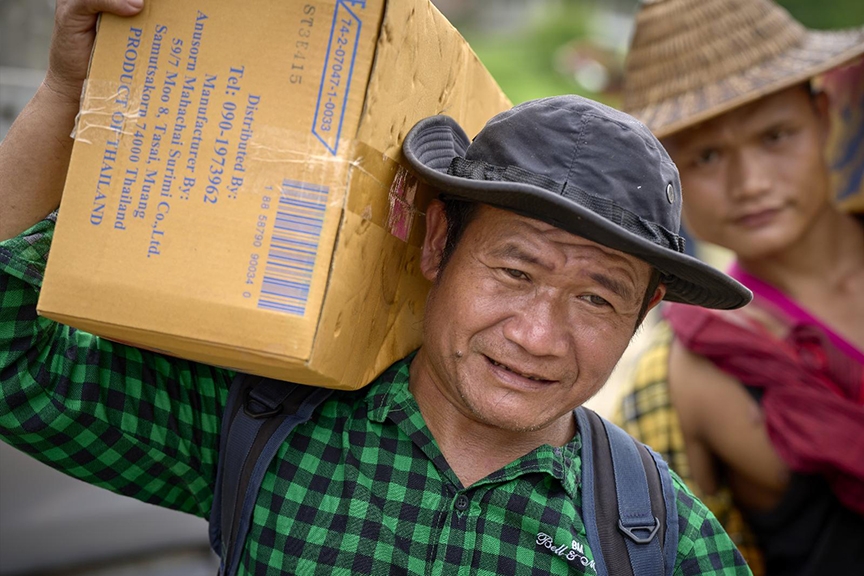
MAE SAM LAEP, Thailand. Pah Kler climbs onto a boat laden with bags of rice and disappears around a bend in the Salween River, on his way to deliver lifesaving aid to families hiding in the jungle in Myanmar.
A Catholic catechist, Kler coordinates cross-border aid to 43 separate groups of people displaced by the brutal violence that followed a 2021 military coup in Myanmar.
“People began showing up near my village at the beginning of the year, and new families continue to arrive. They can’t go back to their villages because they’re afraid of airstrikes by the military,” Kler told Catholic News Service.
“They’re in bad shape. When they left home in a hurry, they couldn’t carry anything. They look for root crops in the jungle that they can boil. They’ve gotten some help from other villagers, but this is the time of year between crops when there’s no excess food. When we get this rice to them, they’ll boil it with forest greens and bamboo shoots. It will keep them alive for a while.”
More than 1.3 million people remain displaced across the country; more than 1 million of them have been displaced since the 2021 military takeover, according to an Oct. 1 report from the U.N. Office for the Coordination of Humanitarian Affairs.
Over 14 million people – roughly one-quarter of the country’s population – need humanitarian assistance, according to the World Food Program. Yet the military continues to restrict or outright block their access to aid, so getting food and other supplies to the needy is challenging.
Kler works closely with officials from Thailand’s Diocese of Chiang Mai. With support from Maryknoll – the Catholic Foreign Mission Society of America – diocesan officials purchase food, medicines and shelter materials and transport them to where the Salween River forms the international border.
There, Kler and other volunteers from Myanmar’s Diocese of Hpa-an take over, transporting the material along the river to a point where it can be offloaded. The rice is then transported on the backs of volunteers, who walk circuitous forest paths that take them far from military checkpoints along the roads. Some routes take up to two-and-a-half days, Kler said.
During one recent trip, he and other volunteers carried in one month’s supply of rice to 429 families living in one displaced settlement.
While food – particularly rice – remains the priority, the Catholic supply chain also brings in medicines; Kler said malaria, diarrhea and malnutrition are commonplace among the displaced.
Kler told Catholic News Service his faith motivates him to help.
“I do this because I witnessed the suffering of the people. When faced with the sick and hungry, as a catechist my role is to make Church teaching real in the lives of the people,” he said. “And I am the one who knows the people on the Thai side, so I try to be the bridge between the churches on each side of the border.”
Father John Barth, a Maryknoll missionary from Buffalo, New York, who works with the aid operation, said poor Myanmar residents carrying food through the jungle to their suffering neighbors is an image of the Church at its best.
“The catechists and other volunteers are amazing. They take tremendous risks simply to feed hungry people. If we can provide the food, they’ll get it where it needs to be,” he said.
“I grew up hearing the stories of the saints, and these people are as close as I’ve come to meeting real saints. They are heroes.”
Father Barth said the Church is in a unique position to aid the displaced in a political environment where other humanitarian agencies are not welcome.









